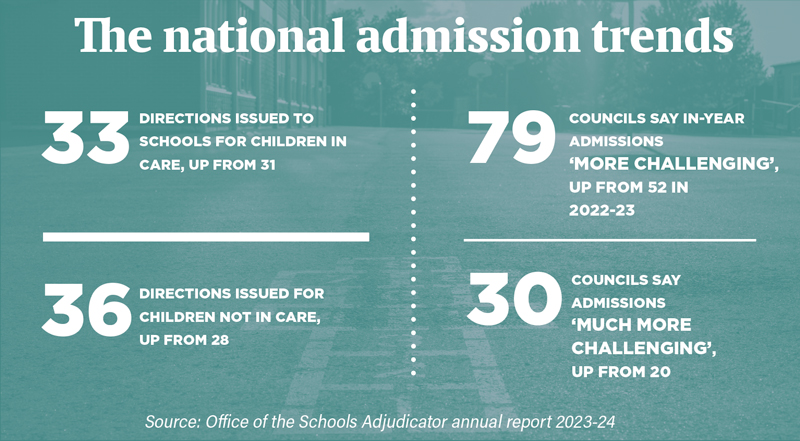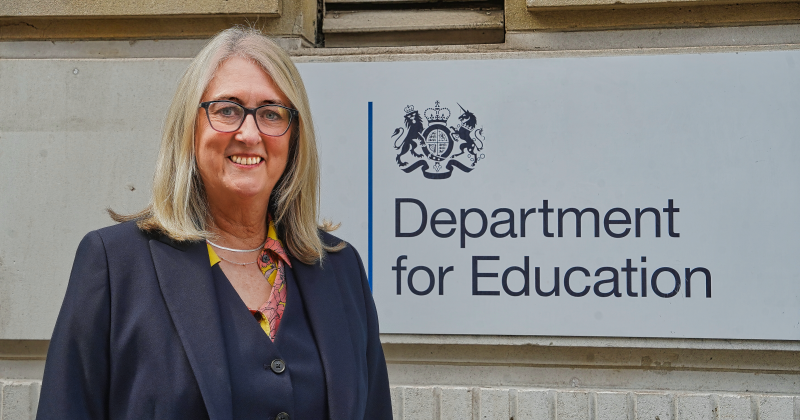Councils have accused schools of refusing so many challenging pupils it “amounts to selection”, capping cohorts to prevent in-year transfers of vulnerable pupils and wrongly turning away youngsters in care.
Local authorities have reported what they suggest are tactics by schools to skew cohorts to the admissions watchdog as part of annual reports, obtained under freedom of information laws by Schools Week.
The reports detail…
- Schools increasingly refusing in-year transfers of challenging pupils. In Blackpool, an inclusion review has been launched over the practice the council says “amounts to selection”
- Councils issuing formal letters to academies they say wrongly refused to admit vulnerable youngsters in care
- Schools accused of “capping” their cohort numbers for years 8 to 11 – causing “turbulence and pressure” for neighbouring schools forced to take in “disproportionate” numbers of children with complex needs
Councils say the problems are leaving more youngsters with complex needs waiting longer for a school place.
But sector leaders say they are being asked to admit so many challenging pupils that it could jeopardise pupil safety, and argue the issues are a consequence of ever-worsening finances and an accountability regime that “disincentivises” inclusion.
Meanwhile, councils also stand accused of not understanding their place planning responsibilities, with some authorities failing to provide evidence supporting their claims.
Refusals ‘amount to selection’
Problems relating to in-year school moves involving own admission authorities were “raised by most, if not all, local authorities”, the Office of the Schools Adjudicator (OSA) revealed in its annual report for 2023-24.
Schools Week has now obtained each council’s full submission to the watchdog.
Several flagged schools with available places regularly refusing to admit challenging pupils outside the normal admission rounds of reception and year 7.
Schools can refuse to offer a place in-year if they believe the child’s behaviour is so challenging it would “interfere with other pupils’ education or jeopardise the right of staff and pupils to a safe and orderly environment”.
But Blackpool accused some academy trusts of citing the refusal so much it “amount[s] to selection”. The area’s secondaries are all academies.
The council said “some are regularly refusing available places for individual children on grounds of prejudice”, with “no specific details” given.
‘Selective citing of the school admissions code’
The authority told the OSA that the “selective citing of one element of the [school admissions] code” to refuse in-year applications should “be stopped” to “prevent growing selection by citing prejudice for some in-year applicants based on previous behaviour whilst others are offered places”.
In all, Blackpool’s secondaries refused 52 applications during 2023-24.
A breakdown, obtained through freedom of information, showed Highfield Leadership Academy accounted for more than half (28) of those.
Star Academies, which runs the school, said rejections were because of “significant behaviour concerns” as these “pupils had been suspended multiple times from their previous schools and had already taken part in behaviour improvement placements … which unfortunately did not succeed”.
The trust also said it had accepted 86 applications for pupils to join in-year over the same period – way more than were refused.
The South Shore Academy made 16 (31 per cent) refusals over the same period. The Bright Futures Educational Trust, which ran the school at the time, said it “co-operated fully” with admissions arrangements and the “joint arrangements with other trusts across the town”.
Admissions ‘friction’
But a spokesperson for Blackpool council said the refusals were “disproportionate” and led to inconsistencies in how places for “children with complex needs” were allocated. It had also created “friction” between trusts.
The four trusts that run the area’s secondaries are now “liaising about the situation” after refusal figures were sent “to facilitate discussions”, the authority added.
Blackpool warned that if an agreement was “not possible, the council would likely refer all future cases” to the schools adjudicator.

But Star said Highfield was “one of only two under-subscribed secondaries” in Blackpool, meaning it got a “disproportionate number of in-year transfer requests”.
“While we are committed to inclusion, expecting a small number of schools to admit all vulnerable pupils — regardless of capacity or context — is neither equitable nor sustainable. It risks undermining the very support systems these pupils need.”
Council to revise fair access protocol
Blackpool has now appointed an external consultant to lead a “review into inclusion across the town”. It will also “revise and re-issue the local fair access protocol”, which “manages the admission of challenging children outside of normal” points of entry.
In addition, a new “memorandum of understanding will underpin the principles of fair practice and adherence to local agreements regarding admissions”.

Star said last year it refused ten of 93 in-year applications which “reflects improved collaboration with partner schools and the use of off-site directions, which allow pupils to be educated at alternative settings while remaining on roll at their original school”.
Richard Sheriff, CEO of Red Kite Learning Trust, said councils are under “enormous pressure” to find “so many children placements”.
But sometimes this is “at odds” with schools – whose priorities are “to run a good school, survive the next Ofsted inspection. They both want the best for children, but have different and competing priorities.”
He also added this has “all become worse” with financially enforced cutbacks.
“Some of the flexibility we had to accommodate in-year admissions has disappeared. Schools are more likely to push back because they don’t feel they have the capacity to cope with the additional pressures of extra children coming in mid-year.”
Children in care refused places
Many councils reported more schools refusing in-year applications.
In Suffolk, in-year refusals of children deemed to have challenging behaviour rose to 62 in 2023-24, up from 33 the year before.
Pupils refused places have to enter fair access panels to identify a school place. But these can take months to resolve, with the OSA reporting more children who were out of school for at least four weeks referred.
Norfolk also said it had seen “an increase in the number of schools refusing to admit” looked-after children “at first request”.
Expecting a small number of schools to admit all vulnerable pupils is neither equitable nor sustainable
Non-faith schools cannot cite the behaviour exemption for these pupils, but some “did not always understand they are required to admit”, the council added. However, it would not provide further details.
The East Riding of Yorkshire council also noted “significant delays” in finding places for looked-after children in “some Hull and Bradford academy secondary schools”.
The council would not name the schools, saying there was “no lawful basis for the disclosure” or “no wider requirement or pressing need for transparency”.
Meanwhile, Nottingham has had to send five formal letters threatening further action to academies that refused places for looked-after children.
Councils lack direction powers
Councils have no powers to direct an academy to admit a pupil – instead they must ask the secretary of state to intervene.
Helen Frost-Briggs, the executive headteacher of John Flamsteed in Derby and one of the schools receiving a letter, said it adheres “to all local and statutory admission protocols”.
The other four schools did not respond.

In Leeds, council officers have also expressed concern that the government now asks to see a child’s care plan whenever a request to direction admission to an academy is made.
This is “irrelevant and intrusive” to pupils in care and “may not support the admission code process to achieve a swift admission for a child with the highest priority”, the council said.
More than 100 local authorities found in-year admissions to secondary schools had become more challenging in 2023-24, up from 72 the year before.
Pepe Di’Iasio, the general secretary of theAssociation of School and College Leaders, said it was “important local authorities and schools work well together over admissions”.
But everyone was “under pressure because of lack of funding, and multiple expectations from every direction. It is likely that these factors play a role when problems arise.”
Admission ‘caps’
Finding youngsters places through fair access panels is disrupted by schools “capping” their cohort numbers for year groups outside the normal points of entry, councils said.
The OSA said councils had “described difficulties caused by schools choosing to reorganise their class structure… to address financial issues, resulting in fewer pupil places”.
Suffolk said “several” secondaries had decided to operate above their year 7 published admission numbers (PANs). But, from September, they “revert back to their determined” admission number, which, among other things, will “minimise in-year” moves.
This was because the schools were “more likely” to refuse moves on the grounds “the admission of another child would prejudice the provision of efficient education or … use of resources”.
The council said there “does not appear to be any justification for this when the school will have staffed and organised for the number of students they initially agreed they could take”.
Trust ‘refuses to compromise on quality of education’
The authority named three schools responsible for this in 2023-24. Two are part of the Hartismere Family of Schools, which allocated up to 55 places over PAN.
The trust did not respond to our requests for comment.

Surrey named 54 schools that used this approach this year, 20 of them local authority-maintained. Of the 34 academies, six were run by GLF Schools.
A trust spokesperson said it “refuse[s] to compromise on the quality of education we offer, and so will occasionally implement caps to year groups where we do not have sufficient staffing capacity to accommodate additional pupils”.
Dan Morrow, the chief executive of the Cornwall Education Learning Trust, said such limits were also put in place to keep schools from falling into deficit.
A “number of local authority schools have funded deficits … [which are] propping their class structures up”, allowing them to take on more pupils in-year.
Refusing schools ‘cause turbulence’
But Suffolk said the practice could lead to “turbulence and pressure” in neighbouring schools forced to admit a “disproportionate” number of such children.
Blackburn with Darwen council reported “significant challenge” caused, in part, by “some schools reducing their admission number” for years 8 to 11.
It said schools have had to “make difficult choices” because of the “challenging financial climate”. But it had “discussed the ongoing reduced capacity issues” at Aldridge Education trust, which runs four schools in the area, with the DfE.
Figures obtained through FOI show admission numbers across two of the MAT’s schools were up to 66 places lower than their original PAN.
An Aldridge spokesperson said it had “a responsibility to manage resources carefully and ensure value for money”, with decisions on class structures based “on exiting and expected student numbers, staffing and budget planning”.
The trust “continue[s] to work closely” with the council and DfE “to support in-year admissions and fair access placements, ensuring all students are placed appropriately and supported effectively”.
Schools reduce admissions
Central Bedfordshire said caps could create “a lack of school places in areas of need and have transport implications for the authority”.
In Somerset, 90 children who had moved to the area had to go through fair access panels because most were in Taunton where all four secondaries were at capacity for “all year groups with the exception of year 7”.
Two “reduced their admission, making them full” and did so again for 2024-25, the council said.
The authority said in some cases limits “are reduced by only a very small number” that have “no effect” on resources. This made it think “this is purely for the purpose of being able to refuse applications”.
Blackdown Education Partnership, which runs Castle School in Taunton, said it was “over its PAN” in every year group and had more pupils than its published capacity. But it “can’t continue to admit over PAN”. The school is working with Somerset to “find a solution to the excessive demand”.
The other schools did not respond to request for comments.
Council ‘misconceptions’
Morrow argued that “no one wants to not allow children to be admitted, but we are funded on pupil numbers. A number of us have changed our models to accommodate falling rolls in a way that’s strategic and planned. [Admission teams] holding us to PANs which are then out of date becomes really counter-productive.”
Samira Sadeghi, the Confederation of School Trusts’ director of governance, said there were a “number of misconceptions held by local authority staff about how school places operate”.

The OSA has even criticised councils for “erroneously referring to the PAN in year groups other than the normal years of entry or to ‘working PANs’, a term which … has no basis in law”.
Adjudicators have determined “that seeking to apply an admission number to any year group other than the normal year of entry … is contrary to the [admissions] code”.
Calls for admission limits for other year groups
Councils have called for admission limits to be set to other year groups “to enable in-year admissions to function more effectively”. But the OSA said it could not support this unless the admission code was changed.
Councils raised other concerns in their statutory annual admission reports, but were unwilling to evidence their claims.
Haringey pointed to “anecdotal evidence” of so-called “cherry picking”. Bournemouth, Christchurch and Poole council reported “a number” of academies “will not offer places to children for whom there is no information regarding behaviour at previous schools available”.
Others insist on families visiting their schools for a meeting before offering them a place, despite the authority advising them “these practices are not compliant with the school admissions code”.
And in Suffolk, authority chiefs are “seeing a growing number of parents/carers who apply for a primary school place, claiming to be ‘refused’ verbally rather than in writing”. But the councils refused to provide further information.
Will school bill plans solve problems?
Jon Andrews, of the Education Policy Institute, said some of Labour’s proposals under the schools bill “may go some way to address some of these issues”.
The introduction of a single unique identifier for all children and a compulsory register for those not in school would mean that pupils who “are missing out will be identified”.

Meanwhile, the government is also planning to give councils the power to direct academies to admit a pupil to ensure unplaced and vulnerable children secure a school place quickly.
A new duty for schools and councils to co-operate on admissions will be introduced, with the education secretary able to “intervene” if relations break down.
Baroness Amanda Spielman, the former chief inspector, speaking in the House of Lords on Tuesday, said: “There is an obvious incentive for local authorities to use this power to offload the most difficult children.”
This would “leave academies to shoulder a disproportionate responsibility for the most difficult and even dangerous children, and to inflict the greatest risk on the other children and staff in those academies”.
Bill will allow councils to ‘reduce delays’
However, Jacqui Smith, the skills minister, said the move would enable councils to “reduce delays in securing vulnerable children a school place”.
Currently, it takes 38 days for the secretary of state to decide on an admissions direction for an academy.
“That is a long time for a vulnerable child to be without a school place,” she said.

Under Labour’s plans, the DfE’s regional directors will also be able to issue compliance orders where academies are not meeting or “acting unreasonably” in relation to their legal duties, including over admissions.
But Sadeghi said academy trusts and councils “generally work closely together on school admissions”. She pointed to findings in the OSA report showing “a very strong consensus that the annual admission rounds work well”.
Despite this, Carl Cullinane of the Sutton Trust said Labour’s changes could be “transformational in tackling segregation … and making admissions more inclusive”. Currently, this was “left to the goodwill of individual school and MAT leaders … to take the lead”.
“These are tentative steps, we want to see the government take bold strides … with a school accountability system that reduces disincentives to do so.”
However, Mark Boylan, a Sheffield Hallam University professor of education, said small changes to a school’s intake could make “quite a big difference to Progress 8 scores. You can’t really try and put right admissions policy unless you address accountability measures.”















Glad to see this story. I first highlighted the issue some years ago – see blog https://johnohowson.com/2021/01/23/time-for-jacobs-law/ on my wordpress blog
Here’s how that blog ended in 2021 The DfE must act now to ensure all children have a school place within a specified time frame, whether they move to a new area or are excluded by a school. There must be a register of unplaced children of school age that is regularly reviewed by a senior officer and a politician in each local authority, and Ofsted should update the Secretary of State each year about the national picture.
It is time for a Jacob’s Law. His death will not then have been for nothing.
As soon as yoi start measuring schools performance using the overall attainment as the measure of success then it is to be expected that schools would not want to recruit customers from the lower levels of achievement bands.
Why is anyone surprised?
This is a dangerous article implying that schools are at fault for the systemic issue surrounding provision for vulnerable children. I am normally very supportive of the articles you write but this is unhelpful and geared towards political narratives rather than supporting those at the coal face.